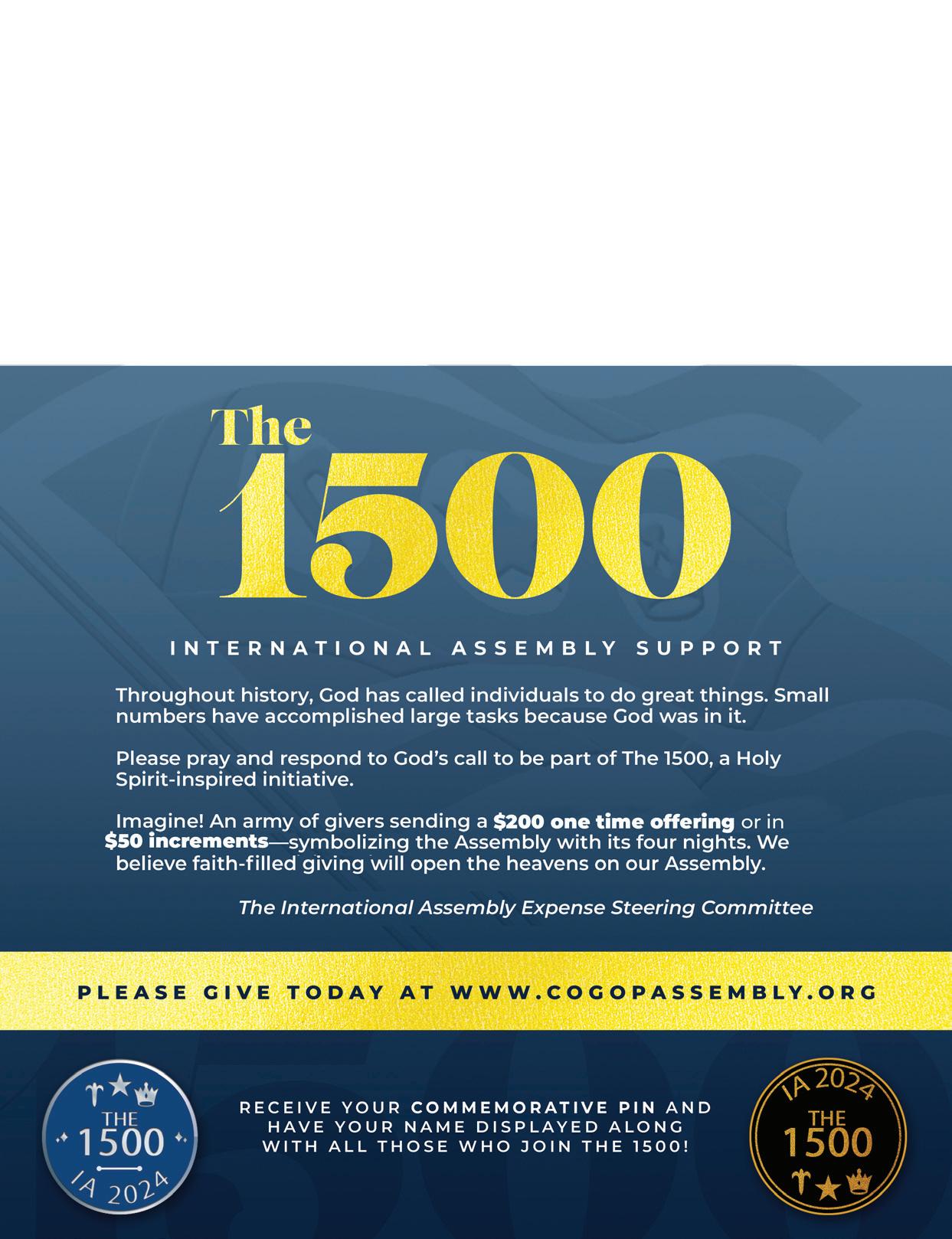MESSENGER
THE OFFICIAL PUBLICATION OF THE CHURCH OF GOD OF PROPHECY

Ready to Reconcile the World
Ready to Receive the Word
Ready to Serve with Excellence



Ready to Reconcile the World
Ready to Receive the Word
Ready to Serve with Excellence

WE BELIEVE in the Holy Trinity—one God, eternally existing in Three Persons: Father, Son, and Holy Spirit.
We believe in one God, the Father, creator of heaven and earth, of all things seen and unseen.
We believe in one Lord, Jesus Christ, the only Son of God, eternally begotten of the Father. All things were made through Him and for Him. He is true God and true man. He was conceived by the power of the Holy Spirit and was born of the virgin, Mary. He suffered, died, was buried, and on the third day He rose from the dead. He ascended to the right hand of the Father, and He will return to judge the living and the dead. His kingdom will have no end.
We believe in the Holy Spirit, the Lord and giver of life, who eternally proceeds from the Father. He is Teacher, Comforter, Helper, and Giver of spiritual gifts. Through Him the saving and sanctifying works of Jesus Christ are applied to the life of believers. He is the empowering presence of God in the life of the Christian and the church. The Father has sent His Son to baptize with the Holy Spirit. Speaking in tongues and bearing the fruit of the Spirit are New Testament signs of being filled with the Holy Spirit.
We believe that salvation is by grace through faith in the sacrificial death of Jesus Christ on the cross and that He died in our place. The believer’s sins are forgiven by the shedding of His blood. We believe that healing of mind, body, soul, and spirit is available to the believer through the blood of Jesus Christ and the power of the Holy Spirit. We believe in one baptism in the name of the Father and of the Son and of the Holy Spirit.
We believe that the grace of God brings forgiveness and reconciliation to those who repent, as well as transformation in holiness, enabling them to live a Christ-like life. Sanctification is both a definite work of grace and a lifelong process of change in the believer brought by the blood of Jesus, the Word of God, and the enabling power of the Holy Spirit.
We believe in one holy, universal church, composed of all true believers in Jesus Christ, offering fellowship and calling for service to men and women of all races, nations, cultures, and languages. We believe in the spiritual and ultimate visible unity of the church.
We believe that the Bible—both Old and New Testaments—is the inspired Word of God. The Bible is God’s revelation of Himself and His will to humankind, sufficient for instruction in salvation and daily Christian living. The Bible is the Christian’s rule of faith and practice.
We believe that God will ultimately reconcile all things in heaven and earth in Christ. Therefore, we look forward to new heavens and a new earth in which righteousness dwells.
Executive Editor/Publisher: Tim Coalter
Managing Editor: Marsha Robinson
Copy Editor: Katherine Osborn, DMin
Editorial Assistant: Roxanne Corbett
Graphic Designer: Sixto Ramírez
The Church of God of Prophecy is a vibrant, worldwide body of believers, united in worship, working hand-in-hand to share God’s love and a message of hope to the brokenhearted. The organization has more than a million members and more than 10,000 ministers, worshiping in more than 10,000 churches or missions in 135 nations of the world.
Church of God of Prophecy Core Values
• Prayer
• The Harvest
• Leadership Development
• Biblical Stewardship
• Service
Vision Statement
Reconciling the world to Christ through the power of the Holy Spirit
Mission Statement
The Church of God of Prophecy is a Christ-exalting, holiness, Spirit-filled, all-nations, disciple-making, churchplanting movement with passion for Christian union.
General Presbytery:
Tim Coalter: Presiding Bishop
Brian Sutton: North America
Clayton Endecott: Wider Europe and the Middle East
Benjamin Feliz: Mexico/Central America/ Spanish-Speaking Caribbean
Clayton Martin: Caribbean/Atlantic Ocean Islands
James Kolawole: Africa
Tim McCaleb: Asia/Australia/Oceania
Gabriel E. Vidal: South America
White Wing Messenger (ISSN 0043-5007) (USPS 683-020) is published monthly as the official publication of the Church of God of Prophecy, 3720 Keith St. NW, Cleveland, TN. Send all materials for publication to Editorial Department; PO Box 2910, Cleveland, TN 37320-2910; email: editorial@cogop.org; fax: (423) 559-5151. For a free subscription, email wwm@cogop.org, visit whitewingmessenger.net, or call (423) 559-5540. Donations for the White Wing Messenger may be sent to the above address. All Scripture references are from the King James Version unless otherwise indicated. POSTMASTER: Send address change to White Wing Messenger, PO Box 2910, Cleveland, TN 37320-2910. Please submit all material to the White Wing Messenger; Managing Editor; PO Box 2910; Cleveland, TN 37320-2910; phone (423) 559-5320; email us at editorial@cogop.org.
6 Ready to Reconcile the World to Christ
Tim Coalter, Presiding Bishop
8 Ready to Receive the Word: The Berean Perspective
Bishop Roger Justiniano, MDiv, DD
10 Ready to Receive the Word and Be a Change Agent
Janice Miller
12 Ready to Serve with Excellence
Bishop Ricardo Hinsbis
14 Serve from the Center
Bishop Scott Gillum
16 Ready to Act with Compassion
Obed Natán Chic
18 Ready to Disciple
Bishop Shaun McKinley, PhD
19 Fully Prepared and Willing to Serve: Aligning to a Core Value
Bishop Nonito Que
20 Combat Ready
Simon Röck
22 Ready to Give
Bishop Nathaniel Beneby
24 Accredited Ministry Development
26 Global Missions Ministries
31 Heritage Ministries
4 Readiness: Its Implications
Bishop James Kolawole
Visit us online—whitewingmessenger.net
The White Wing Messenger is a member of the Evangelical Press Association
“These [Bereans] were more noble than those in Thessalonica, in that they received the word with all readiness of mind, and searched the scriptures daily, whether those things were so” (Acts 17:11 KJV).
Like a standard matchstick box containing numerous flammable wooden matches, the text under examination is inundated with a plethora of divine embers capable of igniting a holy conflagration anywhere.
Paul’s initial evangelistic attempt in Thessalonica was met with mixed feelings. For three sabbath days consecutively, he reasoned with the people out of the Scriptures, giving scriptural reasons why Jesus was the anticipated Christ. This dedicated advocate of the gospel was met by chronic, diehard opponents with mixed results. It was clearly revealed that “some of them believed” (Acts 17:4) and were converted, but that is not the end of the discourse; Scripture makes it abundantly clear that some of “the Jews believed not.” That is to say that by the exercise of their will, they rejected the gospel deliberately (v. 5). It is quite revealing as well as mindboggling to see what a faithful dissemination of the gospel produced in this context. Despite both positive and negative reactions, the gospel remains the only hope for a guaranteed eternity. The commitment of the apostles in this episode is clear—they lived to preach the gospel irrespective of the consequences.
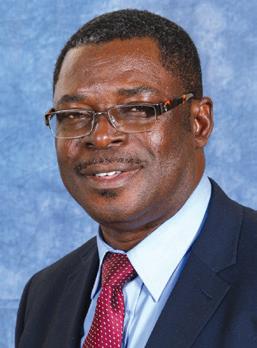 Bishop James Kolawole Africa General Presbyter
Bishop James Kolawole Africa General Presbyter
“These that have turned the world upside down are come hither also” (Acts 17:6).
What instrument did Paul and Silas use to turn their world upside down? Indisputably, it was the gospel—the faithful preaching of the New Covenant—God’s Word rightly divided. The gospel, by itself, is the power of God unto salvation, and it needs to be declared unapologetically (Romans 1:16). God educated Jeremiah on the intrinsic components of his Word when he said, “Is not my word like as a fire? saith the Lord; and like a hammer that breaketh the rock in pieces?’’ (Jeremiah 23:29).
More so, God is eternally committed to fulfilling his Word to its minutest details because he is the same yesterday, today, and forever. No spoken word from God shall be without power nor impossible to fulfill. If God says a thing, it will come to pass in clinical exactitude. God watches over his Word to perform it. God is in his Word and, like him, his Word commands all the attributes of divine omnipotence. The Word, like God, is sacrosanct. The Word is not going to be more omnipotent, more divine, more sovereign, or more able tomorrow than it is right now! The Holy One is a God within arm’s reach and a God afar off as well; this is equally true with his Word. That is why Paul did not change the content of the gospel in the face of threats and imminent death.
“And the brethren immediately sent away Paul and Silas by night unto Berea. . .” (Acts 17:10).
Paul and his companion, Silas, were unabashed, undeterred, and undaunted by the diabolic orchestration of the opponents of the Word of God in Thessalonica and proceeded to Berea with the same fire in their bones. They replicated in Berea what they did in Thessalonica, which means that they consistently spread the Word forthrightly. With this same fire, they preached the gospel with fervor, conviction, and passion. It was clear Paul and his companion lived for the gospel alone without an alternative plan. The sum total of their lives was the gospel in its entirety. They knew that when it comes to the pivotal issue of salvation, the gospel has no substitute! This is the singular explanation for their unflinching devotion.
“The Lord gave the word: great was the company of those that published it” (Psalm 68:11).
God is ready to unleash an avalanche of destiny-defining blessings, but his readiness will not automatically result in a massive transformation of lives. The passing of times and seasons cannot diminish an ounce of his divinity, and no one is beyond the reach of his everlasting arms, but God expects the “militant” church to take an active role. Throughout the Scriptures, when God plays his part, he expects his servants to play theirs as well. That, brethren, is a recurring point in the entire gamut of God’s Word.
“The LORD was ready to save me,” Hezekiah posited prudently (Isaiah 38:20).
The Highest is ever ready to be the quintessential help
in times of trouble. He is more eager to save men than men are willing and ready to be saved! This is not a sweeping compliment but a biblical reality. He is not only fully ready to unveil his mercies, but he is at the same time fully prepared to get you to your resplendent place in life and destiny: “I have prepared my dinner: . . . and all things are ready” (Mathew 22:4). That submission did not say, “All things will soon be ready” or, “All things may soon be ready.” He was not sounding futuristic or probable when he said authoritatively that “all things are ready.” Thus, there are no meaningless details in the Word of God!
The passing of times and seasons cannot diminish an ounce of his divinity, and no one is beyond the reach of his everlasting arms....
Furthermore, God’s readiness also reveals his willingness to step into divergent situations and transform such for his glory. “For thou, Lord, art good, and ready to forgive” (Psalm 86:5). Entrenched in God’s readiness is his willingness to manifest his goodness.
God’s readiness also manifests his altruistic purposes. God’s dealings with Isaiah and others in the Scriptures reveal that God is not a purposeless entity; he is very intentional and deliberate with his dealings with men. God wanted a sanctified representation on the mission field and proceeded to purge the young prophet. “Lo, this hath touched thy lips; and thine iniquity is taken away, and thy sin purged” (Isaiah 6:7). God enabled Isaiah with a succinct and revolutionary touch—a cleansing touch because serving in whatever capacity requires a divine encounter as well as a God-given ability to work and walk in holiness. Otherwise, the by-product of such an endeavor will not only be counterproductive but catastrophic.
Additionally, it was written that Isaiah was divinely ignited— set on fire with a live coal taken from the heavenly altar. One of the seraphim took the live coal and laid it upon Isaiah’s mouth (vv. 6–7); essentially, his mouth was set on fire! If Isaiah needed this blessed resource, then we do as well. We need divine fire now more than ever because, without it, we are not ready for New Testament work—a work that requires the pragmatic enduement of Pentecostal fire! Fireless believers are liabilities on the mission field. It takes this divine resource—holy fire—to produce God-glorifying, biblical results.
“Also I heard the voice of the Lord, saying, whom shall I send, and who will go for us? Then said I, Here am I; send me” (Isaiah 6:8).
The search for usable vessels is still gaining momentum. Are you “send-able”? Are you sent? Who assigns you? Will God accept your representation? Are you truly ready? Can God trust you with his fire? Are you diverting his glory for personal aggrandizement or narcissistic reasons? Are you
ready to serve the Master on his terms?
Like the Bereans, the noble thing to do when the Word of God is preached is to receive it first with all readiness (without reservations) of the mind, then research it by comparing scripture to scripture, line upon line, to validate its content, its source, its authenticity, its veracity, and consequently, its legitimacy. After that, what corresponds with the entire spectrum of the Scriptures is to be accepted holistically. The Lord said, “But to this man will I look, even to him that is poor and of a contrite spirit, and trembleth at my word” (Isaiah 66:2). God will honor those who honor his Word in this way, but the “gospel” that is perverted, polluted, and contrary to the Word of God is to be rejected and thrashed audaciously.
“These were more noble than those in Thessalonica. . .” (Acts 17:11).
What is more, the Bereans redefined nobility. Nobility was explained in the text as the quality of receiving the Word of God with all readiness of the mind. With all the compartments of their mind, that is, they received the gospel wholeheartedly with eagerness, enthusiasm, and unforced predisposition to compliance. Job said, “I have esteemed the words of his mouth more than my necessary food” (Job 23:12). This virtue is demonstrated in one’s attitude towards the Word of God. The attitude of the Bereans to the Word of God changed their status from nonentities to nobles. Contrariwise, it is ignoble to treat the Word of God with levity, negative criticism, disdain, skepticism, or with a judgmental mindset as certain Jews did in Thessalonica.
The secret of the Bereans’ nobility is also tied to their daily commitment to the Scriptures. It was written that “they received the word with all readiness of mind, and searched the scriptures daily, whether those things were so” (Acts 17:11).
Determined in their quest to unearth the truth, they dug deep into the Word regularly to grow their convictions. They brought their minds into constant contact with the revelation of the Scriptures that, on a day-to-day basis, gave scriptural validity to their perception. Their daily attitude to the Word altered their altitude to the mountaintop of divine nobility. Their daily habit of searching the Scriptures grew their spiritual cognition from assumption to actuality, from presupposition to certainty, and from mere postulations to pragmatic faith! Their remarkable resilience culminated in the transformative power of conviction!

“And Jesus, walking by the Sea of Galilee, saw two brothers, Simon called Peter, and Andrew his brother, casting a net into the sea; for they were fishermen. Then He said to them, “Follow Me, and I will make you fishers of men” (Matthew 4:18-20 NKJV).
This is our calling—to reconcile the world to Christ—to be fishers of men. Most fishermen (and women) in the area where I live fish with a rod and reel. However, Peter and Andrew were fishing with nets when Jesus called them to be fishers of men, so let’s stick with net fishing for the sake of this discussion. I have one question for you to consider: Are you ready to fish?
Are you ready? Are you where the fish are?
I can sit on the front porch of my house and talk about fishing, and I can read magazines or watch videos about the art of fishing, but I will never catch fish from my front porch. Likewise, we can sit in our churches and talk about reaching the world for Christ. We may even attend conferences or apply ourselves to academic studies to be better equipped to fish for men; however, we will never catch them until we go to where they are.


Jesus modeled this principle in Luke 5 when he attended a great feast where tax collectors and sinners were present. The religious establishment was shocked that he would be found in their company. When the Pharisees complained and questioned why he was eating and drinking with tax collectors and sinners, Jesus answered, saying, “Those who are well have no need of a physician, but those who are sick. I have not come to call the righteous, but sinners, to repentance” (Luke 5:31–32).
Jesus was intentional about positioning himself to be where the fish were. He spent the great majority of his time outside the “church building”—eating with sinners, entering the home of Zacchaeus, engaging in conversation with the woman at the well, standing with the woman who had been caught in adultery, meeting with a Pharisee named Nicodemus under the cover of darkness to explain what it meant to be born again, looking beyond his own pain and suffering to offer eternal life to the man on the cross, and so on. He went to where the fish were, and then told us to do the same, saying, “Go into all the world, and preach the gospel to all creation” (Mark 16:15). Until we “go,” we are not ready to fish for men. Are you ready? Are your nets mended?
When Jesus found James and his brother John and called them to fish for men, they were mending their nets. The word for “mending” in Matthew 4:21 does not necessarily mean that James and John were fixing their nets because they were broken. Mending also carries the denotation of equipping them—adding something to the nets to perfect them, making them more complete and useful. The same Greek word appears also in Ephesians 4:12 where it refers to the perfecting or completing of the saints. To mend is to prepare, to equip, to perfect, to complete, to fix, to join together, and to restore. We, too, need to see that our nets are mended— not merely fixing a tear, but doing the positive work of developing, perfecting, completing, and equipping so that we are at our best when we cast our nets. What is it in you that needs to be fixed or completed? Do any of your relationships need to be mended? Do you have shortcomings, gaps, or other issues that need the Lord’s mending? What can be added to your net to make it more useful and
effective as you fish for men? Abraham Lincoln once said that if he was given six hours to chop down a tree, he would spend the first four hours sharpening his blade. This is what it means to mend our nets. Are you ready? Are you ready? Are you prepared for what might be caught in your net?
I was just a kid when Dad and I joined an oldtimer on a fishing excursion. We went to where the fish were and carefully released the mended nets into the water. The real excitement came as we began pulling the nets back into the boat. I can tell you from experience that you do not target a certain kind of fish when you are fishing with nets. With each pull of the net into the boat, there may be trout, flounder, sea bass, stingrays, sharks, crabs, or any other sea creature.
Whatever is in the water may end up in our nets! When we draw them in, they are seldom scaled, cleaned, and filleted. Fish are, by nature, slimy and stinky. If we are to reconcile the world to Christ, we must find the means to accommodate the “fish” that God is putting in our nets.
Jesus spoke this parable, saying, “Again, the kingdom of heaven is like unto a net, that was cast into the sea, and gathered of every kind: Which, when it was full, they drew to shore, and sat down, and gathered the good into vessels but cast the bad away. So shall it be at the end of the world: the angels shall come forth, and sever the wicked from among the just” (Matthew 13:47–50 KJV).
Our responsibility is to cast the net into the sea of humanity, gather of every kind, and fill the vessel. We have not been assigned the responsibility of determining which ones are keepers and which should be thrown back into the water. The task of gathering the good and casting away the bad has been assigned to the angels at the end of the world.
So, the question is, are you ready? Are you where the fish are? Are your nets mended? Are you prepared for what might be caught in your net? Are you ready to reconcile the world to Christ through the power of the Holy Spirit? It is my prayer that every one of us will be able to answer in the affirmative, YES, I AM READY!

As soon as it was night, the believers sent Paul and Silas away to Berea. On arriving there, they went to the Jewish synagogue. Now the Berean Jews were of more noble character than those in Thessalonica, for they received the message with great eagerness and examined the Scriptures every day to see if what Paul said was true. As a result, many of them believed, as did also a number of prominent Greek women and many Greek men. But when the Jews in Thessalonica learned that Paul was preaching the word of God at Berea, some of them went there too, agitating the crowds and stirring them up. The believers immediately sent Paul to the coast, but Silas and Timothy stayed at Berea. (Acts 17:10–14 NIV)
The formal establishment of the People’s Republic of China was proclaimed by Mao Zedong in 1949. Due to heavy persecution, the China Inland Mission deemed further work in the country was impossible and ordered all missionaries to leave within the year. Within Reach Global reports “a ‘reluctant exodus’ of missionaries left the country, leaving the indigenous churches to do their administration, support, and propagation of the Christian faith.”
The Chinese underground Church would face some of the most extreme forms of persecution for their faith in Jesus over the next decades, leading mission organizations concerned that this was the end of Christianity in China. However, this was not the case; the Christian church grew by leaps and bounds despite the persecution. “Today it is estimated that there are 70 to 100 million Christians in China. There are now more Christians in China than there are communist party members.” According to Within Reach Global, “Forced atheism created a vacuum of spiritual hunger” that has left the hearts of young Chinese people open to the gospel.
Chinese believers have shown the world how they received God’s Word with readiness of heart and visible appreciation when given their first Bibles. The Berean spirit is still alive and well today.
Apostle Paul, accompanied by Silas and Timothy, had just left Thessalonica due to persecution from the Jews after they had presented the gospel there. Nevertheless, “some of the Jews were persuaded and joined Paul and Silas, as did a large number of God-fearing Greeks and quite a few prominent women” (v. 4). Arriving in Berea, Paul’s message was met with a different response.
The Bereans’ Nobility. The Berean Jews were described as having a more noble character than those in Thessalonica. “More noble,” εὐγενέστεροι (eugenesteroi), literally means more noble by birth; descended from more illustrious ancestors. But here the word is used to denote a quality of mind and heart. The Bereans were more generous, liberal, and noble in their feelings—more disposed to inquire candidly into the truth of the doctrines advanced by Paul and Silas. Proof of their noble disposition is seen in their willingness to examine the accuracy of any doctrine presented.

Bishop Rogelio Justiniano is an ordained bishop with the Church of God of Prophecy and currently serves as the national bishop of the Philippines. Bishop Justiniano was formerly a translator for the White Wing Publishing House and Press and trained with the COGOP School of Practical and Advanced Studies through the International Offices’ Leadership Development and Discipleship ministries. He lives in Taytay, Rizal, Philippines, with his wife of 35 years, Flor.
Diligent Examination of Scriptures. These believers are applauded for using cautious skepticism. They heard a claim and made a sincere effort to validate its veracity. They looked to Scripture to respond, not relying on blind faith or hard cynicism. They examined the Scriptures daily to verify whether what they heard aligned with God’s Word. This diligent study reflects an attitude of readiness and willingness to actively engage with the Word of God.
Open-mindedness. The Bereans’ open-mindedness was pivotal in their readiness to receive God’s Word. Openmindedness does not imply accepting everything without scrutiny, but rather approaching God’s Word with a willingness to learn, unencumbered by preconceived notions.
Eagerness to Learn. The Bereans did not approach the Scriptures with indifference; instead, they were enthusiastic about deepening their understanding of God’s truth. This eagerness fueled their commitment to daily study.
Active Engagement. Readiness is an active state, requiring intentional engagement with the Word of God. The Bereans did not passively receive information; they
participated in the process by examining and verifying the teachings. This active engagement is essential for a transformative encounter with God’s Word.
Foundation of Faith. The Bereans understood the foundational role of Scripture in their faith. Acts 17:11 emphasizes that they examined the Scriptures to validate the teachings they received. Paul advised Timothy that “all Scripture is God-breathed and is useful for teaching, rebuking, correcting and training in righteousness, so that the servant of God may be thoroughly equipped for every good work” (2 Timothy 3:16–17).
Source of Truth. In a world filled with diverse beliefs and ideologies, the Bereans recognized that the ultimate source of truth and standard for living is the Word of God.
Transformative Power. Because the Bereans readily received the gospel presented by Paul and company and were committed to diligently studying the teachings alongside the Scriptures, their lives were changed by the transforming power of God’s Word.
Continue on page 28


C.S. Lewis said it may be hard for an egg to turn into a bird, but it would be harder for it to learn to fly while remaining an egg. We choose either the transforming power of God’s Word or we choose to remain the same. Choose well, for the choice determines our distance vision and readiness to be change agents in God’s hand. Meeting with God on the pages of his Word lifts us into his presence where he speaks his heart into our hearts by his Spirit. We are transformed into people whose highest purpose is to fulfill God’s desires and initiatives; Christ is formed in us (Galatians 4:19) as we are being changed into his image (2 Corinthians 3:18).
Leaders of transformation identify change agents early in the project. These are people who come along beside another, quickly catch the vision, and effectively run with it. God looks throughout the earth to identify change agents for his initiatives. David is an excellent example, of whom God gave this testimony: “I have found David the son of Jesse, a man after My own heart, who will do all My will” (Acts 13:22 NKJV).
As young David pursued the heart of God, he became a man of passion, anchored in God’s purpose. He moved from a surface relationship into the depths of God’s glory.
How did David develop a heart anchored in God’s purposes?
1. It started with David, the worshiper.
David worshiped Almighty God from very early in his life. Many of his psalms were written when he was a young boy tending his father’s sheep. In Psalm 8, he declared that the Lord’s name is excellent in all the earth and his glory is above the heavens. He was not just repeating words he had heard others say; this was a cry from the very depths of his own soul as he experienced the presence of the living God. David stood in awe of the Lord’s majesty, in humility before the Creator. A relationship of understanding developed between them which aligned David’s heart with God’s heart. David experienced bumps along the way, as we all do, but we know from Scripture he was a worshiper throughout his life.
2. Young David gained experience and developed skills. David had challenges as a shepherd that would terrify the bravest. First Samuel 17:34–35 gives his play-by-play about a lion and a bear. When one came to take a lamb, David went out

Janice Miller loves studying and teaching the Word of God. She has published two books, While Men Sleep (2016) and Critical Thinkers (2018), and has recently begun screenwriting. Married since 1975, she and her husband, Roy, live in Gallatin, Tennessee, where both are active in ministry at the Gallatin COGOP.
after it, struck it, and delivered the lamb. When the predator rose against him, he caught it by its beard, striking and killing it.
The Spirit of God rose up in David when these predators showed up. His shepherd’s heart sent him into swift action. His passion for protecting the sheep overrode any concern for his own safety. After the conquest, David did not see any need to boast in his own ability, as he recognized the LORD was his divine Deliverer. There was a quiet confidence in this young person. He knew God and God knew him.
3. David’s assignment (1 Samuel 17:17–27)
a. David’s father gave him the initial assignment.
b. As a change agent, David demonstrated organizational skills:
• Rose up early for the trip
• Arranged a keeper for his father’s sheep
• Strategized the time and location for his arrival
• Arranged a keeper for his carriage while at the battle sight
c. Soon after David arrived, he realized the assignment from Jesse was just the surface level. He quickly adjusted his actions for God’s assignment.
d. As David talked with his brothers, Goliath appeared.
4. David’s character revealed (1 Samuel 17:28–31)
a. As David was about to face this huge assignment, he had to deal with issues from his own brother. His oldest brother Eliab was angry—possibly unresolved jealousy from when David was anointed king instead of him. This
baggage led him to falsely accuse and cast a shadow on David. Eliab tried to belittle David by telling him to mind his own business and go tend to his scrawny flock of sheep.
b. David had to face insults from Goliath (1 Samuel 17:42–44).
c. These are issues that change agents face, which is why courage is imperative. David’s humility, patience, and constancy of purpose were visible.
d. David was not intimidated; he continued talking to people and gathering information on short notice.
5. David’s negotiating skills (1 Samuel 17:31–40)
Saul heard that young David was at the battlefield asking questions and sent for him. We see why negotiating skills are necessary for change agents. David told King Saul he wanted to fight the Philistine.
Oswald Chambers said that when we receive a commission from Jesus Christ, the memory of what God wants will always come like a prod, an urge; we will no longer be able to work for him on the common-sense basis. God is calling change agents transformed by his Word for such a time as this.
• C. S. Lewis, Mere Christianity (London: William Collins, 2012).
• Oswald Chambers, “Is This True of Me?” (March 4), My Utmost for His Highest, https://utmost.org/is-this-true-of-me/.

God is calling change agents transformed by his Word for such a time as this.

This is an important question for those who want to serve God as he deserves. The answer will help us to serve God with excellence and, thus, glorify his name through us.
Imagine for a moment that you find yourself in the presence of God to give an account for your life on earth and, at the end, the sentence is, “I never knew you: depart from me, ye that work iniquity” (Matthew 7:23 KJV). Surely it would be the saddest day in all our history. For this reason, it is necessary to constantly examine how our spiritual lives are and how our faith in Christ is. A person who has faith in Christ, a person who lives according to God’s heart, is a person who demonstrates it by loving and serving others.
Anyone can serve God, but often it is not done with excellence. The Bible says, “And whatever you do, do it heartily, as to the Lord and not to men” (Colossians 3:23 NKJV). When we honor and love God, we will give our best.
Serving God with excellence should be an important topic for the church in the 21st century. Dietrich Bonhoeffer said, “The church is only the church when it exists for others.” Bonhoffer’s words are significant for the church because they make us see that our service to God is our reason for being. If the church stops serving God and its community with excellence, we lose our essence. Dr. Justo González says something interesting regarding this topic:
The Church is born, not when the Lord calls some fishermen, but when He calls them to make them “fishers of men”; not when a group of Christians lock themselves in a room “for fear of the Jews,” but when Jesus Christ says to those Christians, “As the Father has sent me, I send you”; not when the disciples have the mystical experience of seeing tongues of fire above their heads, but when that experience is translated into a testimony that crosses all language barriers.”1
According to González, the church fulfills its mission when it is preaching, baptizing, discipling, and attending to the needs of its community; it is in those moments that the church IS the church of Jesus Christ.
Excellence, according to the dictionary, is “the state or quality of excelling or being exceptionally good,”2 a quality that makes something worthy of singular appreciation and esteem.
There are two things we must keep in mind to serve God with excellence.
To serve, we need the mind of Christ.
Christian service does not begin in the acts or actions of service, but in the mind and in the heart. Acts of service are important, but so also is the attitude with which we serve.
It is an axiom to say that we need the mind of Christ to serve. When we speak of having the mind of Christ, we refer to thinking and feeling like Christ. This is a process in which we will be transformed as we submit ourselves
“A church is only the church when it exists for others.”
—Dietrich Bonhoeffer

to the Word of God and the Holy Spirit. The book of Philippians tells us that when we have the mind of Christ, it will be reflected in our lives—in our daily behavior. Dr. Eldin Villafañe tells us,
The challenge to the contemporary church, which goes against the modern or postmodern mind, is to develop a Christian mindset, to have the mind of Christ; it is to demonstrate the phronesis by means of kenosis. It is to demonstrate a Christian mentality that is willing to exercise self-emptying and, thus, surrender one’s prestige, prerogatives, and powers in favor of liberating and redemptive purposes.3
Dr. Villafañe tells us that having the mind of Christ leads us to “emptying ourselves.” This is important for the service we have to offer to our community and to the people because one of our biggest obstacles to service is that we think only of ourselves, of our needs, and we completely forget about the needs and problems of others.
In view of the above, it is of great importance to cultivate the mind of Christ in us so that at some point we can say, “It is no longer I who live, but Christ lives in me” (Galatians 2:20). This will help us to be the light the world needs to see.
To serve, we need the Spirit of God.
Another key element we need to serve with excellence is to submit ourselves to the Holy Spirit—to be sensitive to his voice, to be passionate about what
he is passionate about, to love what he loves, and to serve as God wants us to serve.
The great need to submit to the Holy Spirit so that he can work and serve through us was demonstrated in the ministry of our Lord. The Spirit of God was upon Jesus for the purpose of serving those most in need as expressed in the Gospel of Luke:
The Spirit of the Lord is upon me, because he has anointed me to proclaim good news to the poor. He has sent me to proclaim liberty to the captives and recovering of sight to the blind, to set at liberty those who are oppressed, to proclaim the year of the Lord’s favor. (Luke 4:18–19 ESV)

Continue on page 28
Ricardo Hinsbis Espinoza was born on December 22, 1979, in Talara, Peru. He studied Theology at the Universidad Seminario Bíblico Andino and is currently pursuing a master’s degree at Pentecostal Theological Seminary. He, his wife (Estela), and their daughters reside in Paraguay, where he serves as the national bishop for the Church of God of Prophecy.

I could start this article with motivational phrases to encourage readers to change their behavior rather than focusing solely on religious teachings. Paul put it this way to the Colossians:
Let the peace of God rule in your hearts, to which also you were called in one body; and be thankful. Let the Word of Christ dwell in you richly in all wisdom, teaching and admonishing one another in psalms and hymns and spiritual songs, singing with grace in your hearts to the Lord. And whatever you do in Word or deed, do all in the name of the Lord Jesus, giving thanks to God the Father through Him. (Colossians 3:15–17 NKJV)
This verse suggests that our actions—“whatever you do” (v. 17)—are a direct result of having the Word deeply ingrained in our hearts. Instead of just working for God, our lives should express service based on his work within us.
We might tire of working for God, but we should never tire of working with him. We might grow weary in our service, which is natural, but we should never grow tired of service that revolves around him. Serving is not about us; it starts with him working within us. What he does within us will reflect in our lives through our service. Paul, writing to the Philippians, records one of the guiding verses in my life: “For it is God who works in you both to will and to do for His good pleasure” (Philippians 2:13). When our service is focused on ourselves and seeking rewards, it resembles what Jesus warned against in Matthew 6:1–3—performing acts of charity to gain praise from others.
Being ready to serve is about having right motives. Serving with ulterior motives may earn us praise from people, but followers of Jesus should seek applause from heaven, not earth. Our motives depend on our center. When Jesus is at the center of our lives, our service is centered on the heart and mind of God. Paul’s words align with Jesus’: “. . . Rather, in humility value others above yourselves, not looking to your own interests but each of you to the interests of the others. In your relationships with one another, have the same mindset as Christ Jesus” (Philippians 2:3–5 NIV).
From the beginning of God’s communication with humanity, the message was clear. He was to be the center of life, providing the foundation for biblical servanthood.
• In Genesis, the Tree of Life stood at the Garden's center (Genesis 2:9), symbolizing that life flows from it to those who partake.
• To Abraham, God said, “I am Almighty God; walk before Me and be blameless” (Genesis 17:1 NKJV). While God spelled out his promises in other encounters with Abraham, here God places expectations on him to live a life worthy of their covenant relationship. These words do not mean Abraham was sinlessly perfect, but they imply that God expected him to center every aspect of his life around honoring the Lord. God was to be the center of all.
• To Moses, God laid out how Israel should camp, with their tent doors facing the tabernacle, which housed the Ark of the Covenant. This arrangement ensured no tribe
was farther from the center than another.
• To Israel, the command was clear: “You shall have no other gods before Me” (Exodus 20:3). Israel was to worship God and serve him only. When confronted by the devil, Jesus affirmed, “You shall worship the Lord your God and serve Him only” (Matthew 4:10).
• To the Church, Jesus declared, “Love the Lord your God with all your heart, with all your soul, and with all your mind” (Matthew 22:37).
• In Revelation, we see imagery of Jesus, the Lamb, standing amid heavenly scenes (Revelation 5:6; 7:17), symbolizing his central role in eternity.
It is evident from these examples that the Bible teaches humans to serve God. In the Old Testament, Joshua proclaimed, “As for me and my house, we will serve the Lord” (Joshua 24:15). Paul celebrated the Thessalonian converts because they “turned to God from idols to serve the living and true God” (1 Thessalonians 1:9). Paul often referred to himself and other Christians as “servants” or “slaves” of Christ and God (Romans 1:1; Ephesians 6:6). Peter echoed this in 1 Peter 2:16 and 2 Peter 1:1.
However, as servants, we are not meeting a need that God has; he lacks nothing. He owns everything, and he does not need our supply. Acts 17:25 states, “And he is not served by human hands, as if he needed anything. Rather, he himself gives everyone life and breath and everything else” (NIV). So, while we serve him, it is not because he lacks anything. He chooses to use us as the visible expression of his kingdom.
Matthew recorded Jesus’ words, “No one can serve two masters. Either you will hate the one and love the other, or you will be devoted to the one and despise the other. You cannot serve both God and money” (Matthew 6:24).
Continue on page 29

Bishop Scott Gillum has served in full-time ministry for 44 years in many capacities. He is the current chairman of the International Assembly Finance and Stewardship Committee of the Church of God of Prophecy. His appointed ministry calling has taken him to North Carolina, Kansas, California, Kentucky, Texas, and Florida. Bishop Gillum’s passion is to care for and equip pastors to equip leaders for life. Scott and his wife, Brenda, currently reside in Clermont, Florida, where they serve as pastors to pastors (Florida State Bishop). They have two adult children and two grandchildren.

Service is greatness.

In our Christian life, compassion, rather than being a feeling of pity, should be a state of empathy that reflects feeling deeply what other people feel. Compassion goes beyond just feeling the desire to help; it is an action clothed with mercy, which means that it is accompanied by the love of God in helping one’s neighbor with great passion (voluntary surrender). The quality of being compassionate is not “wanting” but “doing.”
Peter, inspired by the Spirit of God, writes in his first epistle, “Finally, all of you be of one mind, having compassion for one another, love as brothers, be tenderhearted, be courteous” (1 Peter 3:8 NKJV). These words were written in the Holy Scriptures to be practiced, not occasionally, but every day (several times a day) without partiality (no favoritism). Compassion, indeed, implies “giving” and not “receiving.” Paul agrees with Peter when giving his speech: “I have shown you in every way, by laboring like this, that you must support the weak. And
remember the words of the Lord Jesus, that He said, ‘It is more blessed to give than to receive’” (Acts 20:35). Peter provides a theoretical-practical explanation, while Paul projects the practical-effective model of what it means to be compassionate. Both contributions complement each other, presenting us with a realistic scenario of the patent (visible) needs in this lost and hopeless world and placing upon our shoulders the responsibility to make use of compassion, not as an option, but as a Christian duty.
Our ultimate example of compassion is our Lord Jesus Christ:
• He had compassion on the widow of Nain when she was on her way to bury her son. He raised him up (Luke 7:11–17).
• He had compassion of the paralytic of Bethesda, a man who had been sick for 38 years waiting for a healing miracle. He healed him (John 5:1–9).
• He had compassion for the multitude. He

healed those in the crowd who were sick (Matthew 14:14).He had compassion as he wept over the death of his friend Lazarus. He showed how much he values true friendship (John 11:35).
• He had compassion for the people when he provided food for them. He demonstrated that blessing is not only done with words, but primarily with deeds (Mark 6:30–44).
• He had compassion for the entire world by willingly dying on the cross to bring us salvation and eternal life. He demonstrated his great love by dying in our place (1 John 3:16).
Jesus taught the parable of the Good Samaritan which shows how this man, moved by mercy, helped the person who had been stripped of everything and left half dead (Luke 10:30–34). Being compassionate stirs us to action. If we only feel sorry or pity for others
and do nothing about it, it is not compassion. The Epistle of James emphasizes that faith without works is dead. It is preposterous for someone to claim to be a Christian without having even an ounce of mercy toward their neighbor (James 1:27; 2:15–17).
When we are compassionate, we are cooperating with God's mission on earth: to reconcile the world to Christ by bringing the good news of salvation to the lost and needy. Ephesians 2:4–5 (KJV) says, “But God, who is rich in mercy, for his great love wherewith he loved us, even when we were dead in sins, hath quickened us together with Christ, (by grace ye are saved).” This is the absolute expression of compassion!
1 Cambridge Dictionary , s.v. “Compassion,” https://dictionary. cambridge.org/us/dictionary/english/compassion.
2 GotQuestions.org, “What does the Bible say about compassion?” https://www.gotquestions.org/Bible-compassion.html.

When we are compassionate, we are cooperating with God's mission on earth: to reconcile the world to Christ by bringing the good news of salvation to the lost and needy.

“They received the word with all readiness of mind” (Acts 17:11).
The Bereans are mentioned in the New Testament, specifically in Acts 17:10–15. This passage recounts the missionary journey of the apostle Paul and Silas to the city of Berea:
The brothers immediately sent Paul and Silas away by night to Berea, and when they arrived, they went into the Jewish synagogue. Now these Jews were more noble than those in Thessalonica; they received the word with all eagerness, examining the Scriptures daily to see if these things were so. Many of them therefore believed, with not a few Greek women of high standing as well as men. But when the Jews from Thessalonica learned that the word of God was proclaimed by Paul at Berea also, they came there too, agitating and stirring up the crowds. Then the brothers immediately sent Paul off on his way to the sea, but Silas and Timothy remained there. Those who conducted Paul brought him as far as Athens, and after receiving a command for Silas and Timothy to come to him as soon as possible, they departed. (ESV)
The Bereans are described as noble or more noble than the Thessalonians in their reception of the message preached by Paul and Silas. The key characteristics that define the Bereans are their eagerness and diligence in examining the Scriptures. They did not accept Paul’s teachings blindly but instead sought to verify the truth by comparing it with the Scriptures. This attitude of the Bereans reflects a commendable approach to receiving and

Bishop
evaluating new teachings. Their commitment to studying the Scriptures daily and their openness to the message brought by Paul and Silas resulted in many of them coming to faith. It also distinguishes them as an example of thoughtful and discerning listeners in the early Christian community.
The Bereans’ story encourages believers to engage with the Word of God actively, to test and discern the teachings they encounter, and to seek understanding through a diligent study of the Scriptures. Their example has inspired generations of Christians to approach their faith with intellectual rigor and spiritual discernment.
In Acts 17:11, we encounter the Bereans, a group of individuals commended for their eagerness to examine the Scriptures daily to verify the teachings they received. This verse serves as a powerful inspiration for Christians to be ready and willing to disciple others in the faith. Discipleship involves more than just sharing information; it requires a genuine commitment to nurturing spiritual growth, encouraging a deep understanding of the Scriptures, and fostering a vibrant relationship with God. Drawing from the Bereans’ example, we will explore the theme of readiness to disciple others in the Christian faith, examining the principles and practices that can guide believers in fulfilling this vital aspect of their calling.
Continue on page 31
This generation is driven by personal career growth and achievements. Service as a core value may be counter-cultural, but serving the way the Bible teaches us is exactly what we aim for as a movement. Let’s explore the intricacies of service and emphasize its role as central to a meaningful and purpose-filled life.
Service extends beyond actions; it is an ethos deeply rooted in the heart. Service arises from an authentic desire for the well-being of others. Matthew 20:28 (NLT) says, “For even the Son of Man came not to be served but to serve others and to give his life as a ransom for many.” To embrace service as a core value requires a shift in perspective and a commitment to prioritize others’ needs over personal gain.
On a physical level, good relationships with others and integrity form the bedrock of effective service. Proverbs 27:17 (NIV) says, “As iron sharpens iron, so one person sharpens another.” Here, we see needed relational dynamics. Humility and integrity (in our actions and relationships) foster trust. To learn from and serve one another, this groundwork must be laid.
Spiritual preparation is equally essential to service. A relationship with God is foundational to our spiritual readiness. James 4:8 invites us to “Come near to God and he will come near you.” The movement toward God in our daily lives leads to spiritual preparedness.
The Word of God is an indispensable guide as we prepare for spiritual readiness. Psalm 119:105 (KJV) declares, “Thy word is a lamp unto my feet, and a light unto my path.” Engaging with and meditating on the Scriptures is the compass directing us toward a life aligned with biblical principles. A consistent prayer life, as encouraged in 1 Thessalonians 5:16–18, will help us develop a lasting connection with our Lord: “Rejoice always, pray continually, give thanks in all circumstances, for this is God’s will for you in Christ Jesus” (NIV). Prayer becomes the lifeline, fostering intimacy with God and strengthening our spiritual foundation as we look forward to a life of service.
Spiritual preparedness is not only about personal growth but also about aligning our will with the will of God. In this way, we embrace submission and walk in obedience. James 4:7 (KJV) instructs, “Submit yourselves therefore to God. Resist the devil, and he will flee from you.”
A heart committed to service places God’s work before personal desires. We must serve from the heart. In Matthew 20:28, our Lord Jesus Christ underscores this principle in his own life, setting himself as an example for believers: “For even the Son of Man came not to be served but to serve others and to give his life as a ransom for many.”
Our mindset drives service. Romans 12:2 calls us to transform our minds, stating, “Do not conform to the pattern of this world, but be transformed by the renewing of your mind” (NIV). A renewed mind recognizes the intrinsic value of selfless actions.
First Corinthians 15:58 encourages us, “Therefore, my dear brothers and sisters, stand firm. Let nothing move you. Always give yourselves fully to the work of the Lord, because you know that your labor . . . is not in vain.” We are ready to serve when we see service as a privilege. “Here am I; send me.” Isaiah 6:8 should be our response to the Lord's call to serve.
Awareness and Realization
Service is not an end unto itself. Philippians 1:27 admonishes us, “Whatever happens, conduct yourselves in a manner worthy of the gospel of Christ.” Service, when viewed through the lens of the gospel, becomes a natural outpouring of a life dedicated to advancing the kingdom of God. Service is not self-serving; it is directed toward the greater good—the gospel of Jesus Christ and the glory of God. Philippians 2:13 highlights this truth, “For God is working in you, giving you the desire and the power to do what pleases him.” Service, as a core value, is an active participation in God’s transformative work, with the ultimate goal of bringing glory to his name.
Being fully prepared and willing to serve starts with God's transformative power in us. Coupled with submission and acceptance of such a call in our hearts, minds, and actions, service becomes a guiding principle that shapes our character, relationships, and trajectory. Biblical service transcends personal ambitions and offers the highest purpose—the advancement of the gospel of Christ and the glorification of God. Amen.




Once upon a time, I served my country as a soldier. Now, full disclosure: Military service was compulsory, and I only served for 11 months and never did anything heroic. Still, it was a memorable experience, and some of the concepts have stayed with me ever since.
One such concept is the idea of “combat readiness.” The concept conveys the idea of the readiness of any military unit or its members to successfully fulfill tasks for which the unit was created, or the individual was trained. It is an umbrella term for a host of specific elements that must come together to give any mission the high likelihood of success. Typical examples are physical fitness, mental readiness, chain-of-command stability, and equipment status, among many others. Any of these elements can derail the mission and lead to a failure to execute.
Picturing ourselves as soldiers in Christ’s army can help us to ponder our current state of combat readiness. As Christians, we have been given a mission by our Commanding Officer. The question we must continually ask ourselves is, “How ready are we to fulfill the mission that Christ gave us?”
The Bible makes it clear that we are to focus on our calling as a soldier of Christ. David prays to God, “Blessed be the Lord, my rock, who trains my hands for war, and my fingers for battle” (Psalm 144:1 ESV). Paul exhorts Timothy, “Share in suffering as a good soldier of Christ Jesus. No soldier gets entangled in civilian pursuits, since his aim is to please the one who enlisted him” (2 Timothy 2:3–4). Paul encourages the Ephesians to put on the whole armor of God so that they may “stand firm” (Ephesians 6:11–13). And Paul challenges Timothy to “preach the word; be ready in season and out of season; reprove, rebuke, and exhort, with complete patience and teaching. . . . As for you, always be soberminded, endure suffering, do the work of an evangelist, fulfill your ministry” (2 Timothy 4:2, 5).
Unlike David, most of us are not routinely involved in physical combat. Yet, like David, we can cry out, “Lord, please ready my hands for the spiritual war that is raging and my fingers for every spiritual battle therein!” Though we may not wrestle against flesh and blood, the battle is real. The spiritual rulers, authorities, cosmic powers, and spiritual forces of evil are not to be trifled with. The battle is raging, and we are in the midst of it! Paul informs us that a certain amount of suffering is to be expected. Sharing in the sufferings of the Commanding Officer is expected of the good soldier of Christ Jesus. Within the challenges of everyday life, we are not only called to survive, but to fulfill our ministry. This is a difficult task. However, we have two immense strategic advantages. First, we know that our Commanding Officer has already won the victory for us! We can therefore engage the enemy from a position of

victory. As we celebrate the empty grave at Easter and the reality that death has lost its sting, we can enter the battle with astonishing confidence. Secondly, we have been given the immense privilege of having been sent the Holy Spirit, the Spirit of Jesus himself. Not only can we fight our battles from a position of certain victory, but we fight with the Spirit of God on our side. We do not fight this cosmic battle in our strength.
So, what can we do to ensure that we remain combatready? The first thing to remember is that every detail matters. No element of our lives, no matter how small, is trivial if we seek not to get “entangled in civilian pursuits” and we truly seek only “to please the one who enlisted [us].” I have been called into service by Christ himself. Therefore, all my life is geared towards pleasing him who sacrificed everything for me. This must take priority over all else in my life.
A simple yet crucial thing that we can do is to remain in a constant state of prayer, seasoned with fasting, as the Lord leads us. Ezra exemplified this well when he led the Israelites back to Jerusalem from exile. Ezra writes,
Then I proclaimed a fast there, at the river Ahava, that we might humble ourselves before our God, to seek from him a safe journey for ourselves, our children, and all our goods. For I was ashamed to ask the king for a band of soldiers and horsemen to protect us against the enemy on our way, since we had told the king, “The hand of our God is for good on all who seek him, and the power of his wrath is against all who forsake him.”
So we fasted and implored our God for this, and he listened to our entreaty. (Ezra 8:21–23)
It is through prayer and fasting that we make our petitions known to God, are strengthened by the Spirit, are sanctified through the work of Christ, and receive guidance by hearing his voice. Prayer is essential for combat readiness. If communication between us and our Commanding Officer breaks down, defeat is imminent.
Crucial to combat readiness is maintaining unity at all costs. No army divided amongst itself has any chance of winning a war. A cunning enemy knows this and specifically tries to sow disunity among his foes. “Divide and conquer” has not endured the ages as a viable battle strategy without reason. We must not be ignorant of the schemes of our enemy but remember that he is actively working to sow discord. This is why Jesus prays this farewell prayer: I do not ask for these [the original disciples] only, but also for those who will believe in me through their word, that they may all be one, just as you, Father, are in me, and I in you, that they also may be in us, so
that the world may believe that you have sent me. The glory that you have given me I have given to them, that they may be one even as we are one, I in them and you in me, that they may become perfectly one, so that the world may know that you sent me and loved them even as you loved me. (John 17:20–23)
Two promises stand out: first, the world will only believe that we are sent by God and loved by him if we have unity; second, our unity uniquely displays something of the glory of God. Unity is crucial for success in battle.
Every detail matters. If one searches for an example of this truth, one could point to the importance of physical fitness. All soldiers are required to remain physically fit as part of their combat readiness. With 88 percent of American adults considered metabolically unhealthy (with the developing world catching up quickly as the American diet is exported around the world), it is time to consider if we are guilty of taking ourselves out of the fight before our time. Our lifestyle habits might determine to what degree Jesus can use us. One of our church teachings encourages us to “be not among winebibbers; among riotous eaters of flesh” (Proverbs 23:20 KJV). I have never knowingly been among winebibbers in the Church of God of Prophecy, but I certainly have been among “riotous eaters of flesh” or have been that person myself. While there are no guarantees that sickness might find me along the way simply because I live in a fallen world, I do not want to be taken out of the fight because I failed to take care of my body. I do not want to have to tell my Commanding Officer that I am too physically unfit simply because I could not control myself. As a soldier of Christ, every detail of my life matters.
It is helpful to regularly perform something that is known in the military as a “buddy check”—having someone else check whether all the gear needed is present and in proper operating order. The Bible admonishes us to “consider how to encourage one another in love and good deeds, not abandoning our own meeting together, as is the habit of some people, but encouraging one another; and all the more as you see the day drawing near” (Hebrews 10:24–25 NASB20). We need one another to encourage each other and to speak into each other’s lives.
Time is short. Our Commanding Officer is coming back soon. How will he find his army? How will he find you, soldier? Are you in the fight? Are you combat-ready? If not, do not despair; there is always the possibility of rejoining the fight. Let us be ready for spiritual combat, in season and out of season, anytime, anywhere, by all means necessary.

First Chronicles 29:11-12 (KJV) states ,
Thine, O Lord, is the greatness, and the power, and the glory, and the victory, and the majesty: for all that is in the heaven and in the earth is thine; thine is the kingdom, O Lord, and thou are exalted as head above all. Both riches and honour come of thee, and thou reignest over all; and in thine hand is power and might; and in thine hand it is to make great, and to give strength unto all.
Why give to God? The principal reason we should give to God is really for our own sake. It shows we remember that he is the owner of all we have, and we are only stewards. Giving should be an outward material expression of a deep spiritual commitment, an indication of a willing and obedient heart.
The Bible expressly states how we should give. Here are some examples: (1) according to income, Deuteronomy 16:17; (2) without ostentation, Matthew 6:3; (3) freely, Matthew 10:8; (4) with simplicity, Romans 12:8; and (5) regularly, 1 Corinthians 16:2.
God is not so much interested in how much we give; he is concerned about our hearts and attitude when we give: “You must each decide in your heart how much to give. And don’t give reluctantly, or in response to pressure. For God loves a person who gives cheerfully” (2 Corinthian 9:7 NLT). The apostle Paul admonishes us in the same chapter, “Remember this—a farmer who plants only a
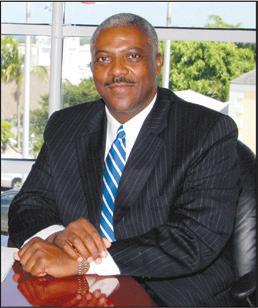
few seeds will get a small crop. But the one who plants generously will get a generous crop” (v. 6).
Giving is an opportunity to demonstrate obedience, love, and faith in God—to express our trust and confidence visibly and tangibly in him above all else. When we give, we illustrate our belief that God can do more with a portion of what he has given us than we can do with all of it. Malachi 3:10 (TLB) states, “Bring all the tithes into the storehouse so that there will be food enough in my Temple; if you do, I will open up the windows of heaven for you and pour out a blessing so great you won’t have room enough to take it in!”
Being ready to give starts with giving of ourselves to God. Paul writes, “Therefore, I urge you, brothers and sisters, in view of God’s mercy, to offer your bodies as a living sacrifice, holy and pleasing to God—this is your true and proper worship” (Romans 12:1 NIV). The call to holy living is to solemnly offer or dedicate to God our life and the “things” in our life for his purpose and glory.
Readiness to give truly emanates from a heart of compassion and empathy, thankfulness to God, and a desire to be a blessing to others. When we reflect on what Christ did for us at Calvary, this should compel us to give readily, not out of compulsion, covetously, callously, or with a carnal heart; but to give willingly, freely, and liberally. Generosity should be a lifestyle of the Christian. Giving is also an act of worship, and it brings glory and honor to God. To be inconsiderate of others, thoughtless, unkind, and to show ingratitude is diabolical and displeases God.
Both planned and spontaneous giving are appropriate. When an individual, corporation, or church is boosting and encouraging giving, this helps us to remember God’s goodness and blessings in our lives, and it prompts us to give. Such reflections also help us to avoid the sin of ingratitude.
Giving has numerous benefits that extend beyond assisting those in need. Research has shown that those who give regularly experience positive effects such as increased happiness, personal growth, and improved well-being. These benefits are not only experienced by the giver, but they also profoundly impact the recipient and the community.
The act of giving is broader than simply donating money to the church or a charity. It includes individuals, families, and businesses, as well as community and church leaders living out a heart of giving their time, talent, and all resources God has entrusted to their care. Living a life of giving helps with the upliftment of society and leaves a legacy that positively impacts the world.
There is a growing inequitable distribution of wealth in the world today. God gives us gifts and talents according to our ability, and it is he who gives us the ability to get wealth: “But thou shalt remember the Lord thy God, for it is he that giveth thee the power to get wealth, that he may establish his covenant which he sware unto thy fathers, as it is this day” (Deuteronomy 8:18 KJV). As a reminder, there is a special blessing when we give to the indigent and most vulnerable among us. Matthew 25:40 (NIV) states, “Truly I tell you, whatever you did for one of the least of these brothers and sisters of mine, you did for me.”
I thank God and pray for the growing list of philanthropists in the world today, and for all who sacrificially give generously of their time, money, experience, skills, or talents to (1) help create a better world for future generations yet unborn and (2) to build the kingdom and the church of God.
My own experience has been a feeling of exhilaration, joy, happiness, and fulfillment when I give from all that God has entrusted to my care. It is my earnest prayer and hope that you will have similar or even greater experiences as you live a life of readiness to give out of a grateful heart, all for the honor and glory of God.

During a recent visit to Barcelona, Spain, I was moved deeply by a sculpture of Jesus hanging above an entryway to the basilica of La Sagrada Familia (the Holy Family). Prior to that time, I grew up hearing the story leading to the crucifixion and reading Bible passages detailing the events. Jesus was falsely accused, bitterly beaten, spat upon, and verbally abused. Roman soldiers divided his clothing and cast lots for his most expensive garment.
I have seen pictures of what artists thought Jesus might have looked like hanging on the cross. Some, like Francisco de Zurbarán, have depicted him with his head tilted to one side, eyes closed, at rest. I suppose they imagined Jesus’ demeanor after his final words, “It is finished” (John 19:30).
Other artists, like Diego Velázquez, have portrayed Jesus exhausted with dozens of thorns penetrating his head and rusty spikes forcing blood from his hands and feet. Perhaps they envisioned him pleading, “Father, forgive them, for they do not know what they are doing” (Luke 23:34 NIV).
In Barcelona, I learned that the construction of La Sagrada Familia has been and continues to be funded largely by ticket sales to tourists. Its construction began in 1882 to encourage Christianity in Barcelona, which was becoming increasingly secular. The temple was designed by Antoni Gaudi, a Catalan architect whose free-flowing works were greatly influenced by nature. The work was so extravagant Gaudi knew he would never live to see its completion, as it would require at least 200 years. However, he dedicated 43 years to the task
before being hit by a trolley car in Barcelona. Fortunately, he left sketches for the remainder of the building, the construction of which continues to this day. The finished basilica will have 18 bell towers: 12 for the disciples; four for the evangelists (Matthew, Mark, Luke, and John); one for Mary, the mother of Jesus; and one for Jesus.
When I arrived outside La Sagrada Familia, I thought it was one of the gaudiest configurations I had ever seen. Scaffolding lined the perimeter of the structure with crane cables dangling from the sky. I was amazed by the size and detail, but it resembled no other cathedral I had ever seen. We arrived on the east side of the building, known as the Nativity Façade, dedicated to the birth of Jesus. Its immaculate bell towers protruded toward the heavens.
Our tour guide led us south alongside the Glory Façade dedicated to the glorious nature of Jesus.
Then we walked west to the Passion Façade. I could hardly believe my eyes. How could he…? How dare he…?
I was astounded to see that Gaudi had the audacity to portray our Lord hanging on the cross with absolutely no clothing. Then the tour guide told us that the church has traditionally depicted Jesus on the cross wearing a loincloth, while historians argue that Jesus was executed in the same manner as any other person in first-century Judaea. Tears welled up in my eyes. I knew Jesus was crucified for crimes he never committed. I knew the physical agony he bore was excruciating. But I had never considered that he endured this type of shame for my sins. Above his bowed head, Gaudi designed Jesus’ hair to lie flat so

that it would resemble an open Bible. My mind raced to the scripture that speaks about the Roman soldiers dividing Jesus’ clothing. Had I missed something?
I decided to do a little research once I returned to Spirit and Life Seminary. Paul Maier, in his book In the Fullness of Time, said that crucifixion was not the absolute worst form of death a person could endure in terms of brutality and duration, but it was definitely the most public. The person being crucified was forced to parade down densely populated streets where he would experience intense shame before all the onlookers. The crossbeam to which the person was fastened was meant to make him an example and motivate others to avoid his crime. Romans learned this form of torture from the Carthaginians, who used crucifixion as punishment for their admirals when they lost sea battles to Rome. Crucifixion was never imposed on Roman citizens. It was reserved for slaves, pirates, political rebels, and religious radicals.1
Source:
Beacon Bible Commentary notes that four soldiers (a quaternion) divided Jesus’ garments as bounty for their brutal work.2 BibleRef.com suggests that the divided items in John 19:23 were a belt, a cloak, a pair of sandals, and a head covering.3 The soldiers decided not to divide the fifth garment mentioned in John 19:24 because the tunic would be worth more if it were all in one piece. They decided instead to “cast lots” or take a chance at winning it. This corresponds with Psalm 22:18, which is a prophecy of the Messiah’s suffering. David felt he had been abandoned by God when God seemed silent during his time of suffering. David’s expression of humiliation, loneliness, and pain offered a glimpse of Jesus’ sacrifice to atone for the sins of mankind. Sadly, the soldiers casting lots for Jesus’ clothing found his raiment more valuable than his life.


Thankfully, the story does not end there! David concludes Psalm 22 by praising God who is always victorious. Three days after Jesus’ crucifixion, Mary Magdalene went to the tomb where Jesus was buried. Seeing the stone had been moved leaving the doorway open, she assumed his body had been stolen. Two angels inside the tomb asked Mary why she was crying. She turned around and saw a man she thought was a gardener. When he called her name, Mary knew his voice. It was Jesus!
My heart still wonders today, as it did outside La Sagrada Familia, how anyone could possibly love me so much. Jesus gives the answer along with a commission in John 15:9–17:

Source:
As the Father has loved me, so have I loved you. Now remain in my love. If you keep my commands, you will remain in my love, just as I have kept my Father’s commands and remain in his love. I have told you this so that my joy may be in you and that your joy may be complete. My command is this: Love each other as I have loved you. Greater love has no one than this: to lay down one’s life for one’s friends. You are my friends if you do what I command. I no longer call you servants, because a servant does not know his master’s business. Instead, I have called you friends, for everything that I learned from my Father I have made known to you. You did not choose me, but I chose you and appointed you so that you might go and bear fruit—fruit that will last—and so that whatever you ask in my name the Father will give you. This is my command: Love each other.
Share the good news of God’s love, not only at Easter but throughout the year!
1 Paul L. Maier, In the Fullness of Time (New York: HarperCollins Publishers, 1991), 164–165.
2 Joseph H. Mayfield, “The Crucifixion and the Burial,” in Beacon Bible Commentary, ed. Ralph Earle, vol. 7, John – Acts (Kansas City, MO: Beacon Hill Press, 1965), 218–219.
3 BibleRef.com, John 19:23, https://www.bibleref.com/John/19/John-19-23.html.

The nature of true Christian love is not only to feel concern for our brothers in their need, but to respond in a way that will assist ministry efforts.
Just recently I traveled to Benin to participate in their national convention. As we traveled hours through that nation, I was so blessed to be safe in the vehicle recently provided to this nation through funding from Harvest Partners and Helping Hand Ministry.
I have often witnessed the transportation challenges of our national leadership in their efforts to minister, train, and invest in national leaders and local churches. Often, transportation challenges become one of the primary difficulties for sustaining a national ministry vision.
Many active national leaders need vehicles due to their responsibility of overseeing and leading more than one nation, region, and/or congregation. In some nations, forms of transportation can become a luxury, costing two and three times as much as what you would pay if purchased in the United States. With additional taxes and import charges, it becomes almost impossible for mission nations to underwrite the costs.
The nature of true Christian love is not only to feel concern for our brothers in their need, but to respond in a way that will assist ministry efforts. Assisting national ministries can provide resources for more effective service, supply provisions for the family, provide transportation toward the progress of the work, and be a source of encouragement for our entire global family.
The Helping Hand Ministry is a ministry that affords individuals the opportunity to give personal offerings for specific mission purposes or ministries over and above the regular national budgeted efforts. This same giving opportunity is provided for local churches through Harvest Partners Project Giving. Through these COGOP-sponsored opportunities, 100% of funding is sent directly to the designated mission nations for the specified purposes.
National Offices need reliable vehicles that can transport people and supplies under a variety of conditions. Pastors and church planters need bicycles, motorbikes, motorcycles, horses, mules, boats, cars, all-terrain vehicles, four-wheel drive trucks, etc. Through your giving, you can become a partner in the many souls a mission worker can reach by means of transportation. When you become an investor in the ministry of these nations, you have not only become a partner in ministry, but you become a rich blessing in the very lives of those who serve.
The cost of a reliable vehicle is conditional upon the nation and the type of transportation to be purchased. Costs can be as small as $100 for a bicycle, or as much as $45,000 for used all-terrain vehicles that can transport evangelistic equipment into the most difficult of regions.
Throughout the New Testament, we read of the early church and their willingness to give. Strong churches helped weaker churches. Poverty-stricken areas were helped by more affluent churches. A system of brotherhood existed. Note Paul’s prayer, “I . . . received of Epaphroditus the things which were sent from you, an odour of a sweet smell, a sacrifice acceptable, well-pleasing to God. But my God shall supply all your need according to his riches in glory . . .” (Philippians 4:18–19 KJV).
Missionaries could not have gone in the past unless people like you and me supplied their needs. They will not be able to maintain the work they have established or reach out to others today unless you and I are committed to that work.
Together, we are an important factor in missions. We can be the hands that extend to the nations today. The amount we give might not be sufficient to cover an entire project,
but working together, any amount given will combine to meet the need.
Listed below are some of the notes of thanks from some of the nations who have received transportation support over the past couple of months.
If you are interested in giving toward this effort, there are many urgent requests that have not been fulfilled. Individuals may give through the Helping Hand Ministry and local churches can give through Harvest Partners Project Giving (HPL2). You may send your offerings to the address below directed to Transportation Appeal 2024. Or you can call 423 559 5207/423-559-5209 or e-mail global@cogop.org.
Thank you for your prayerful consideration.
Dr. Cathy PayneGlobal Missions Ministries
Church of God of Prophecy. P.O. Box 2910 Cleveland, TN 37320 2910

Greetings.
I would like to express my gratitude for your financial help in buying a car suitable for the needs of the national ministry in Egypt. Special thanks are in order to the Breezewood Church in North Carolina for your generous offering and to the care and passion of Bishop Clayton for the whole amount of funding being delivered and for giving us advice.
The car will help the team to move across Egypt, between Cairo and Assiut, and the little villages and suburbs. It will save us time and expense. Rather than renting other cars and dealing with security, we shall use ours, which will be most efficient.
I have attached a picture of the new car to celebrate with us.
Blessings to you all.

Beloved in the Lord,
I come by this letter on behalf of the entire community of the Church of God of Prophecy in the DRC, to thank with all my heart and in all sincerity all our donors for this mark of confidence that they have just made to the Church in the DRC.
The funds you sent allowed us to buy this Land Cruiser Prado Jeep in Dubai. Thank God, the jeep reached me in good condition with a good engine. Included are some pictures of this jeep.
My sincere thanks.
François Mbengayi Nkumbikumbi National Bishop
Greetings in the name of Jesus Christ our Lord and Savior! I pray that all be well with you.
I am extending our appreciation to everyone who contributed funds to purchase this vehicle for the national ministry. I understand that it is a long list of COGOP members and non-members who made the contributions.
May the Lord richly bless each of them!
Bashir Dawood National Bishop

Bishop Mwambigija Eric National Bishop Continue on page 30

Continued from page 9
IV. Overcoming Obstacles to Readiness
Preconceived Beliefs. Holding on to preconceived beliefs is a hindrance to readiness. Unlike the Thessalonians, the Bereans did not allow their embedded ideologies to hinder their reception of the Word of God.
Cultural and Religious Influences. Cultural and religious influences can also hinder readiness to receive God’s Word. Overcoming these challenges requires a commitment to knowing the truth and a willingness to believe God’s Word above all else.
Fear of Change. The Bereans willingly changed as they discovered the truth of the gospel. Fear of change can dwarf spiritual growth; overcoming this fear requires faith in God’s direction as revealed in his Word.
V. Practical Considerations
Importance of Scripture Engagement. The lesson from the Bereans reminds us of the enduring importance of engaging with Scripture. Regular study, meditation, and application of God’s Word are crucial for spiritual growth and readiness.
Cultivating Readiness in Community. The Bereans exemplify the power of a community committed to readiness. Believers should cultivate an environment where open-mindedness, eagerness to learn, and active engagement with God’s Word are encouraged and celebrated.
VI. Conclusion
During the reign of Josiah, king of Judah, the high priest discovered the Book of the Law in the temple of the Lord (2 Kings 22:8). In a neglected corner, the Word of God had been hidden from view, was forgotten, and consequently had no influence on the people. The Jews forsook Israel’s God and turned to idol worship. But once the Scriptures were discovered, King Josiah changed the course of history. He read the Word of God to the people and had the worshipers pledge renewed
obedience to the covenant that God had made with them (2 Kings 23:1–3), thus averting God’s anger and judgment.
We ought to read God’s Word together as families and meditate on its meaning. We must encourage one another to memorize portions of Scripture so that we make God’s Word relevant in our lives. By reading, learning, and knowing the Bible, we commune with God and hear him speak to us. Through his Word, he instructs us on how to live for him, and when we prayerfully dedicate our lives to him, numerous blessings descend upon us.
1 “Watch What Happens When Chinese Christians Receive Bibles for the First Time,” Within Reach Global, April 13, 2014, https:// withinreachglobal.org/chinese-christians-bible-reactions/.
2 “Watch What Happens,” https://withinreachglobal.org/chinesechristians-bible-reactions/.
3 “Missionary Footage Captures Emotion of Chinese Christians Receiving Bibles for the First Time,” International Christian Concern, https://www.youtube.com/watch?v=CkXDcdMNE-I; and “Made in China: The Amazing Story of the Bible in China,” United Bible Societies, https://www.youtube.com/watch?v=vQIxjIkRv8Y.
Continued from page 13
This biblical passage is of great relevance for the church that wants to serve with excellence. We often believe that the Holy Spirit descends upon us only to make us dance and speak in tongues in our churches, and we acknowledge the importance of this, but we also see that the Spirit of God came upon Jesus Christ to empower him to serve according to God’s heart. Similarly, all of us who claim to have the Spirit of God must be empowered to serve with excellence.
It is necessary for every pastor, leader, and member of the church who desires to serve God with excellence to strive to have the mind of Christ and be filled with the Holy Spirit. A lack of either would be detrimental to our ability to serve with excellence.
The Spirit of God empowers us to witness for Christ and to serve our community; therefore, we have no excuse for not serving with excellence, for the Holy Spirit empowers us and is with us in every work we do
for God. Another important point is that God provides the financial and material resources every time we are willing to serve people. It does not matter how little or how much we can use to help people, the most important thing is the attitude of our heart—that we do it with love as unto the Lord—and God will provide according to his riches in glory.
Let us remember the formula for carrying out service with excellence:
Keeping this formula in mind, on the day we stand before our Creator to give account for our life and work on earth, we can hear those beautiful words:
Then the King will say to those on His right hand, “Come, you blessed of My Father, inherit the kingdom prepared for you from the foundation of the world: for I was hungry and you gave Me food; I was thirsty and you gave Me drink; I was a stranger and you took me in.” (Matthew 25:35–36 NKJV)
1 Translated into English from Justo L. González, Historia de las misiones (Buenos Aires, Argentina: Editorial La Aurora, 1970), 23.
2 Collins English Dictionary, s.v. “Excellence,” https://www. collinsdictionary.com/us/dictionary/english/excellence.
3 Translated into English from Eldin Villafañe, La Mentalidad Cristiana y La Postmodernidad: Ensayos de un Pensador Pentecostal (Dominican Republic: Center for Biblical Leadership, COGOP, 2009); previously published as Fe, espiritualidad y justicia (Rio de Piedra, Puerto Rico: Palabra y Más, 2006), 16.
Continued from page 15
When we think about serving money, it does not mean meeting the needs of money; rather, it is about prioritizing our plans and efforts based on money. There are many whose focus in life is on what they think money can provide them. In contrast, serving God means aligning our plans and efforts for the benefit of others while trusting in God’s promises for us. Our lives revolve around positioning ourselves under the waterfall of God’s blessings, seeking his greatest benefit—God himself!
God invites us into his service, not because he needs us, but because he desires us to play a part in
accomplishing his purposes. He achieves his goals by providing us with the grace to do the work for his glory and for our joy. That is the purpose of his world—his glory and the joy of his people in him. Peter encourages us to serve hospitably without grumbling and while using our gifts, recognizing that everything we do should bring praise to God through Jesus Christ (1 Peter 4:9–11).
Serving people who are kind and generous and with whom we agree might be easy. But God calls us to serve in every situation, even to submit to harsh masters (1 Peter 2:18). This attitude demonstrates a changed heart committed to serving others. And when we serve, let us do so with joy, as the Psalmist said, “Make a joyful shout to the Lord, all you lands! Serve the Lord with gladness; Come before His presence with singing” (Psalm 100:1–2 NKJV).
According to the Bible, service is not a means to achieve greatness; service is greatness. Jesus himself exemplified this when he said, “Even the Son of Man came not to be served but to serve, and to give his life as a ransom for many” (Mark 10:45 ESV). Our sacrificial service is not about gaining promotions or recognition; it is about embracing the paradox Jesus taught, where true greatness comes from serving others. When our actions reflect this understanding, all glory will be directed towards God.
Christian service ultimately represents the ministry of the risen Lord Jesus among and through his people. As the apostle Paul wrote, “It is no longer I who live, but Christ who lives in me. And the life I now live in the flesh I live by faith in the Son of God, who loved me and gave himself for me” (Galatians 2:20). Jesus gave his life for us so he could live his life through us. When we receive this truth, we can truly serve as Jesus did, and our lives will have a far greater impact than if we had used them solely for ourselves. While some are more concerned about “lording over” others, it is our service that leads. Let us embrace our calling to serve and not “lord it over” (Luke 22:25) to illustrate the kingdom principle of service as centered in Jesus.
CLICK HERE or use the QR Code below to view and download a Group Leaders Discussion Guide. You will also find the February Messenger with Bishop Gillum’s article on “Mentoring is a Relational Journey” and the Group Leaders Discussion Guide available for download on this web page.
Suggested Reading: Max Depree, Leading Without Power

Continued from page 27

It is with great joy that I write with much thanksgiving and gratitude to report that we bought a four-wheel-drive Mitsubishi Pajero for use by the offices of the National Bishop for Guinea Conakry, Senegal, Guinea Bissau, and Cabo Verde.
A vehicle of this kind is among the best that NGOs and government institutions use here as it fits all terrain. It will withstand the roads and long kilometers we cover in our area to visit our churches and reach new communities for the Lord.
We wish to greatly thank the state of Tennessee, our International Offices, and all those who contributed towards us getting this very big boost (vehicle) in enhancing our mission.
The Lord bless you more and more.
Peter W. Koyea National BishopGreetings. What a great God we serve—a God who listens to secret prayers! He is full of surprises. I am most grateful to the donors for allowing God to use them to meet this need. I never thought that God would respond so quickly to this transportation need.
God knows of our needs, but he is just waiting to hear us ask. I was ashamed to ask, and after asking, he took away not just the shame, but he took away the risk associated with all the breakdowns in remote villages. Sometimes we were forced to sleep until the following day to get a mechanic. I can’t thank our donors enough. I pray that God will grant all their endeavors to success and put an end to their struggles.
On behalf of the Church in Africa, Nigeria, and my family, we say thank you!
Enis James Kolawole
Nigeria National Bishop and Africa General Presbyter
Greetings in the name of Jesus Christ. Thank you so much your love for me and the church family in Cameroon. I appreciate you so much for your concern. I send my thanks and my regards to our Harvest Partner family. Remain blessed in the Lord.
With love and sincere thanks.
Mayeke James

Continued on from page 18
Acts 17:11 states, “Now these Jews were more noble than those in Thessalonica; they received the word with all eagerness, examining the Scriptures daily to see if these things were so.” The Bereans’ eagerness and commitment to verifying the teachings they received set a standard for Christian discipleship. Their approach reflects a combination of openness to learning and a discerning spirit, highlighting the importance of both receptivity and critical examination in the discipleship process.
As Christians, being ready to disciple others necessitates cultivating an attitude of eagerness akin to that of the Bereans. Eagerness involves a hunger for spiritual knowledge, a genuine desire to understand God’s Word, and a passion for personal and collective growth. The Bereans’ daily examination of the Scriptures underscores the continuous and intentional nature of this eagerness. Christians are called not only to receive the Word but also to consistently engage with it, seeking to deepen their understanding and align their lives with its truths.
To be ready to disciple others, Christians must prioritize personal study and understanding of the Scriptures. Acts 17:11 indicates that the Bereans examined the Scriptures daily, demonstrating the significance of regular and consistent engagement with God’s Word. This practice of daily study fosters a solid foundation for spiritual growth and equips believers to share their faith with others.
In 2 Timothy 2:15, Paul instructs Timothy to “do your best to present yourself to God as one approved, a worker who has no need to be ashamed, rightly handling the word of truth.” This admonition emphasizes the responsibility of believers to be diligent in their study of the Scriptures, ensuring that they can accurately and effectively communicate the truths of the Christian
faith. Being ready to disciple others involves a commitment to ongoing learning and a deepening understanding of the foundational principles of Christianity.
Discipleship is not solely an intellectual endeavor; it requires openness to the guidance of the Holy Spirit. Acts 17:11 portrays the Bereans as individuals who examined the Scriptures not in isolation but in reliance on the Spirit’s guidance. As Christians, being ready to disciple others involves cultivating a sensitivity to the leading of the Holy Spirit in both personal study and interactions with fellow believers.
Jesus promised the Holy Spirit as a guide and teacher in John 14:26: “But the Helper, the Holy Spirit, whom the Father will send in my name, he will teach you all things and bring to your remembrance all that I have said to you.” Christians must be attuned to the Spirit’s guidance, allowing him to illuminate the Scriptures, deepen understanding, and empower effective communication of the gospel.
The Bereans’ example also underscores the value of a culture of questioning and dialogue within the Christian community. They were commended for examining the Scriptures, indicating a willingness to engage in thoughtful inquiry and discussion. Being ready to disciple others requires creating an environment where questions are welcomed, doubts are addressed, and sincere seekers are encouraged to explore the depths of the Christian faith.
In 1 Peter 3:15, believers are urged to “always be prepared to make a defense to anyone who asks you for a reason for the hope that is in you.” This preparation involves not only knowledge of the Scriptures but also an openness to engage in dialogue, patiently addressing the inquiries
and concerns of those seeking to understand the Christian faith. By fostering a culture of questioning and dialogue, Christians can create space for genuine exploration and mutual growth in discipleship.
Being ready to disciple others extends beyond intellectual engagement; it encompasses the practical application of Christian principles in daily life. The Bereans did not merely examine the Scriptures for academic purposes; they sought to apply the truths they discovered to their lives. Similarly, Christians must demonstrate the transformative power of the gospel through their actions, attitudes, and relationships.
In James 1:22, believers are exhorted to “be doers of the word, and not hearers only, deceiving yourselves.” Discipleship involves not only imparting knowledge but also modeling the Christian life in a way that inspires others to follow suit. By living out the teachings of the Bible in their daily interactions, Christians become living testimonies of the faith they seek to share, making discipleship a holistic and impactful endeavor.
Effective discipleship is relational, requiring a commitment to building authentic connections with those being discipled. The Bereans’ eagerness and openness were likely fostered within a context of trust and genuine relationships. Being ready to disciple others entails investing time and effort in understanding the individual needs, struggles, and aspirations of those under one’s care.
In Galatians 6:2, Paul encourages believers to “bear one another’s burdens, and so fulfill the law of Christ.” This relational aspect of discipleship involves walking alongside others in their spiritual journey, offering support, encouragement, and accountability. Authentic relationships create a safe space for individuals to express their questions, share their struggles, and experience the transformative power of discipleship within a community of believers.
The theme of being ready to disciple others in the Christian faith, inspired by
Acts 17:11, challenges believers to embody the virtues of the Bereans—eagerness, discernment, and a commitment to the diligent study of God’s Word. Discipleship is a dynamic and transformative process that requires not only the impartation of knowledge but also a genuine investment in the spiritual growth and development of others.
To be ready to disciple involves a multi-faceted approach, including personal study, reliance on the Holy Spirit, fostering a culture of questioning and dialogue, practical application of Christian principles, and building authentic relationships. The Bereans’ example serves as a timeless guide, urging Christians to be active participants in their own spiritual growth and inviting others into a journey of discovery and transformation.
As believers embrace the call to be ready to disciple others, they contribute to the flourishing of a vibrant and resilient Christian community, where individuals are equipped to navigate the complexities of faith and where discipleship becomes a shared endeavor, reflecting the love, grace, and truth of Jesus Christ.

Introduction
Discipleship is not merely a suggestion in the Christian faith; it is a fundamental commandment woven into the very fabric of Christianity. The call to discipleship goes beyond personal salvation, extending to the imperative of guiding others on their journey to follow God. Throughout the Bible, numerous examples illustrate the significance of Christians being ready and willing to disciple others. In this exploration, we will delve into biblical narratives that highlight the essence of discipleship, emphasizing the responsibility of believers to invest in the spiritual development of fellow Christians.
Jesus Christ: The Master Discipler
The epitome of discipleship is found in the life and teachings of Jesus Christ. In the Gospel of Matthew, we witness Jesus extending a simple yet profound invitation to his first disciples: “Follow me, and I will make you fishers of men” (Matthew 4:19). Jesus not only called individuals to follow him but also invested time and effort in nurturing their spiritual growth.
The relationship between Jesus and his disciples serves as a paradigm for discipleship. He did not merely offer theological insights from a distance; he walked alongside them, sharing in their joys and challenges. The Great Commission, found in Matthew 28:19–20, encapsulates the essence of Christian discipleship: “Go therefore and make disciples of all nations, baptizing them in the name of the Father and of the Son and of the Holy Spirit, teaching them to observe all that I have commanded you.”
In his interactions with the disciples, Jesus displayed the characteristics essential for effective discipleship—patience, compassion, and a genuine commitment to the well-being of those following him. As Christians, we are called to emulate Jesus in our readiness to disciple others, recognizing that our journey of faith is intricately connected to the journeys of those around us.
The Apostle Paul’s relationship with Timothy serves as a poignant example of discipleship
spanning generations. In 2 Timothy 2:2, Paul imparts a crucial principle: “And what you have heard from me in the presence of many witnesses entrust to faithful men, who will be able to teach others also.” This verse underscores the multigenerational nature of discipleship, highlighting the need for a continuous chain of spiritual mentorship.
Paul invested deeply in Timothy, not only as a mentee but as a co-worker and a beloved son in the faith. In his letters to Timothy, Paul addresses not only theological matters but also practical aspects of ministry and life. This mentor-disciple relationship serves as a blueprint for Christians today, emphasizing the importance of investing in others and equipping them for the work of discipleship.
Paul’s commitment to Timothy’s growth and development is evident in his letters. In 1 Timothy 4:12, Paul encourages Timothy not to let anyone look down on him because of his youth but to be an example to the believers in speech, conduct, love, faith, and purity. This guidance emphasizes the holistic nature of discipleship, encompassing both spiritual and practical aspects of life.
The relationship between Barnabas and Mark provides a powerful lesson in the restorative nature of discipleship. In Acts 15:36–41, a disagreement arises between Paul and Barnabas regarding whether to take Mark on a missionary journey. Despite their differences, Barnabas takes Mark under his wing, providing him with another opportunity for growth.
This narrative emphasizes the need for patience, encouragement, and second chances in the discipleship process. Barnabas exemplifies the grace-filled aspect of discipleship, demonstrating that believers must be ready not only to guide but also to extend grace and support to those who may stumble along the way.
Mark’s journey, from a potential point of contention to becoming a valuable companion to Paul (2 Timothy 4:11), underscores the transformative potential of discipleship. It showcases that the process involves not just imparting knowledge but also fostering an environment of grace, forgiveness, and restoration.
The dynamic couple Priscilla and Aquila, mentioned in Acts and several of Paul’s letters,

present a compelling model of shared discipleship. In Acts 18:26, they instruct Apollos more accurately in the way of the Lord. This couple not only hosted a church in their home but also actively engaged in teaching and mentoring others.
The example of Priscilla and Aquila challenges traditional notions of discipleship, emphasizing the shared responsibility of all believers to be involved in the spiritual growth of fellow Christians. Their partnership showcases the complementary nature of discipleship, where individuals bring unique gifts and perspectives to the process of guiding others on their faith journey.
Their engagement with Apollos also illustrates their humility and willingness to support others in deepening their understanding of God. The unity and collaboration between Priscilla and Aquila provide a powerful image of how Christian couples, families, and communities can collectively contribute to the discipleship process.
Discipleship is not a passive endeavor; it is an active and intentional engagement with others, reflecting the love, grace, and transformative
power of God. The biblical examples of Jesus, Paul, Barnabas, Priscilla, Aquila, and others provide a rich tapestry of discipleship principles for Christians to emulate.
As Christians, we are called to be ready and willing to disciple others, following the mandate set forth by Jesus in the Great Commission. The journey of discipleship involves not only personal growth but also a commitment to investing in the spiritual well-being of others. Through mentorship, teaching, encouragement, and grace, believers can contribute to the formation of strong, resilient, and faithful disciples who, in turn, continue the cycle of making more disciples.
In essence, the theme of Christians being ready to disciple others to follow God is not just a commendable act, but a divine imperative rooted in the very heart of the Christian faith. As we consider these biblical examples, may we be inspired to embody the spirit of discipleship in our lives, fostering a community where believers actively contribute to each other’s spiritual growth and collectively advance the kingdom of God.

On January 26, 1906, a small group of Bible-believing Christians gathered to pray, seek, and find the truths of what it means to be the Church of God of the Bible
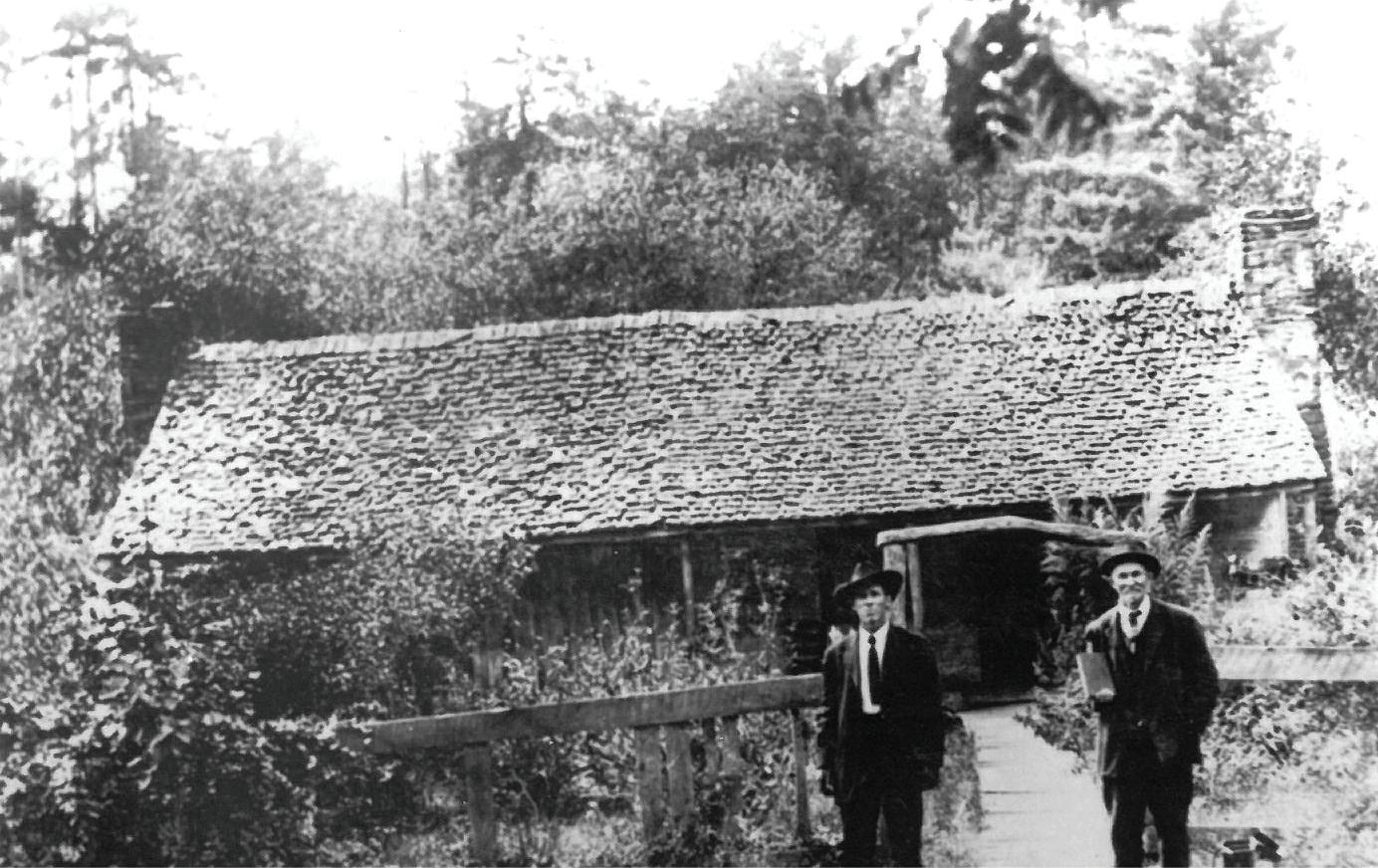
On January 26, 2024, we gathered to celebrate what the Lord has done over the past 118 years We celebrated a history that has seen many advancements, challenges, and blessings As we reflect on our history, some may see a divided history. However, as I look back, I see a victorious history. Through all of the challenges of personalities, practices, business, and more, we have continued to progress as a movement, yes, multiple movements of God-fearing people intent on reaching the lost with the gospel of Jesus Christ.
We took a few moments during the celebration to reflect on the intent of those early church people. As they gathered together to discern the Church of God of the Bible, their hearts were compelled to know the Lord more intimately and deeply To know him, they were disciplined to study and understand the Word of God more fully. From that personal experience with Christ and the study of the Bible, they desired to be the Church of God as it is defined in the Bible. This passion and desire to be God’s church catapulted them into a divine encounter with God where the Holy Spirit descended upon them and they were filled with the dynamic delivering, healing, and convicting power of the Holy Spirit.
That initial small group of believers would soon advance to be a network of churches churches united for one purpose to be the church of the Living God. It is that same desire that, I believe, unites us It is that same passion that propels us And it is that same conviction that will cause us to share the gospel.
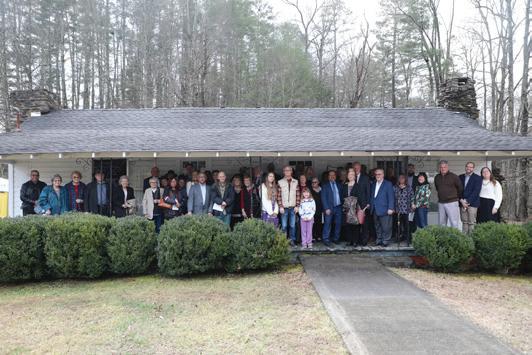
Our guests at this glorious event led us in powerful worship and shared inspiring words of encouragement to keep on reaching the lost. Reverend Roxanne Corbett led our worship as the Spirit hovered over us just as it had in 1906. Church of God Historian Dr. David Roebuck read the minutes of the First Assembly and shared a few thoughts. Bishop Tim Coalter and Dr Tim Hill leaders of the two prominent Church of God movements birthed out of the First Assembly shared with us. You can be inspired by this service as you watch it on our Heritage Ministries Facebook page and other outlets of the Church of God of Prophecy.
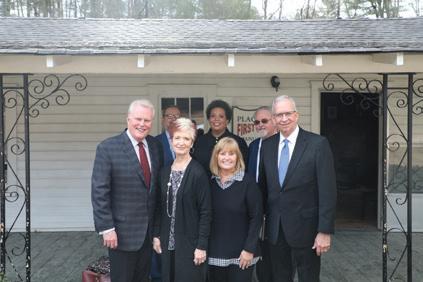
More than 50 people gathered together to celebrate and look what the Lord has done! Millions have been impacted through the inspired Word of God as faithful men and women moved from this house into all regions of the world
Presiding Bishops
Tim Coalter (COGOP) & Dr Tim Hill (COG)
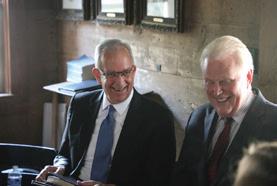

 Bishop Todd D Bagley Heritage Ministries Coordinator
Bishop Todd D Bagley Heritage Ministries Coordinator
